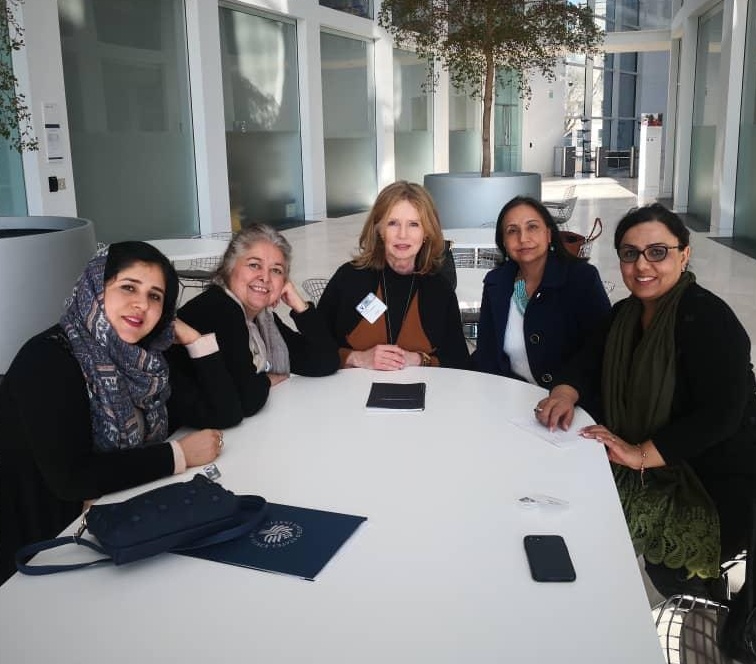The Trump Administration is ready to betray Afghan women. Why we need you to stop that.
WHY WE NEED YOU

With the United States being the main facilitators of these talks, Afghan women and activist groups are specifically calling on members of the Afghan-American community to use their power and voice to amplify theirs. While they are on the frontlines, there is vital work that can be done here. As both American citizens and Afghans worried about the motherland, the diaspora has a strong collective agency in ensuring that any peace processes in Afghanistan are transparent and inclusive. Afghan women are calling on you to reach out to members of Congress. They are simply asking the U.S. to ensure they are represented in peace talks and have their rights guaranteed. The United States has a responsibility to the very women they claimed to liberate 18 years ago. Afghan women, minorities, and youth need to be at the negotiation table because they are the ones that have the most to lose.
Afghan women are calling on you to reach out to members of Congress.
A quick overview
When then-candidate Donald J. Trump ran in 2016, he made various promises to the American people. One of those was reducing American engagement overseas in order to put “America First.” During his first year as President, he promised “an honorable and enduring outcome worthy of the tremendous sacrifices” made in Afghanistan. Time, however, is not on our side. Since those remarks, there has been increasing bipartisan pressure to withdraw troops from Afghanistan. The stakes are incredibly high.
After 18 years, the United States has spent $1.07 trillion dollars of taxpayer dollars on the war, sacrificed thousands of American lives, and lost control over more parts of Afghanistan to the Taliban since their fall in 2001. Since February 2019, former U.S. Ambassador and Special Envoy Zalmay Khalilzad has been leading negotiations between the U.S. and representatives of the Taliban insurgency. While a cease-fire to end the prolonged conflict is deemed as necessary, the currently proposed process raises alarming fears for the peaceful future for all Afghan citizens. Representatives from the Government of Afghanistan and civil society have been excluded from peace talks, and the U.S. military is rushing the withdrawal process. Given the Taliban’s dangerous and reprehensible track record on human and women’s rights, there is strong evidence to suggest that if women and minorities are not at the peace table to defend their hard-earned gains from the last 18 years, they will be traded away in the name of ‘peace.’
In an effort for any peace agreement between the U.S. and Taliban to be sustainable, all stakeholders in the Afghan conflict must be involved in the process of building Afghanistan’s future. Any discussion that moves on without all members of Afghan society paints a risky future for those who have been historically marginalized.
WHAT AFGHAN WOMEN SAY
In the past few months, Afghan women and activist groups from all across Afghanistan have loudly sounded the alarm. They have been barred from participating in the negotiation and are in fear of losing the fundamental and Constitutionally protected rights they gained over the past 18 years. In fact, much of the progress in Afghanistan can be accredited to the women who have been on the front lines of the conflict. Women now make up more members of the Afghan parliament than some Western countries, with a total of 75 in both houses. They are doctors, lawyers and engineers; they are the ones who bore the brunt of war, but have shaped development in Afghanistan to what it is today.
However, the Taliban have proven they have not changed their view on women and their roles in society. In areas under Taliban control, women are still not permitted to leave their house without a male supervisor and women are not allowed to attend school upon leaving their homes. In mid-April, the Taliban even capped girls education in the Sare Pul province to 6th grade and have been reported to have carried out multiple violent attacks against women. The statement released by the Taliban during the talks on women’s rights specifically makes references to curtailing the rights of women in Afghanistan through amending the Afghan Constitution. This is dangerous and unacceptable.
Afghan women cannot and will not go back. Peace should not come at their expense. The Trump Administration’s actions thus far have only improved the Taliban’s standing on the world stage, delegitimizing the status of the Afghan government as a result.
Afghan women cannot and will not go back. Peace should not come at their expense.

WHY THE Women, Peace & Security (WPS)
ACT OF 2017
We are asking the United States Government to follow its own policies and accords; particularly the Women, Peace and Security Act, signed into law by President Donald Trump in October 2017. This act was a bipartisan piece of legislation and aims to increase women’s participation during negotiation and mediation processes. The law mandates gender inclusion in all of the U.S. Government’s security and peacebuilding efforts in fragile countries. A growing body of research shows peace agreements are more likely and sustainable when women are involved in all aspects of the peace process. The current peace talks show that our government is not adhering with its own laws and policies.
WHAT YOU CAN DO
The best way to go about ensuring the WPS Act is adhered to is by Congressional oversight. We need a publicly held hearing — we call on you to emphasize this when reaching out to members of Congress. Follow the action guide, where we have laid out more background and easy to follow steps on how to do this.
